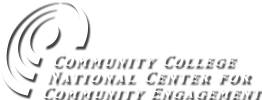Stimulating Moral, Ethical, and Civic Engagement for Learning that Lasts
The Community College National Center for Community Engagement (CCNCCE) and Kapi’olani Community College, University of Hawaii, are leading this proposed Implementation Teagle Foundation Project. The project strongly supports the aims and goals espoused in the Foundation’s Concept Paper, “A Larger Vision for Student Learning: Educating for Civic and Moral Responsibility.” Seven partnering community colleges will be developing course and curricular program models that address the larger aims of liberal education, with an emphasis on the development of students’ “knowledge and capabilities related to personal, civic, and moral responsibility.”
Through the Teagle planning process, the partners, Mesa in Arizona, De Anza in California, Kapi’olani in Hawai’i Delgado in Louisiana, Kingsborough in New York, Queensborough in New York, and Raritan Valley in New Jersey, focused their attention on student learning and assessment.
The seven partners developed a common Big Question: How do we build our commitment to civic and moral responsibility for diverse, equitable, healthy, and sustainable communities? ”Continual engagement with this question will equip students to deal effectively with the large issues of meaning, value, purpose, and responsibility that will surface throughout their lives. Their shared Big Question emphasizes educating for democracy and building commitment through “a set of concepts, a series of practices, and patterns of human agency.” The partners themselves are committed to developing the human agency of faculty and staff to continually engage students in these concepts, practices, and patterns. For the Teagle Implementation process, they developed the following Goal Statement:
To develop replicable models of continued engagement that build students’ current and future commitment to civic and moral responsibility for diverse, equitable, healthy, and sustainable communities. These models will drive further innovation and inform campus, state, and national dialogues on civic and moral learning at community colleges and baccalaureate institutions.
The partners also defined seven objectives and twelve measurable outcomes, committed to ten shared Project Level Activities, and to building upon individual campus strengths to develop a range of replicable and innovative models.
An assessment plan features both qualitative and quantitative learning outcomes assessment, and formative and summative tracking on project outcomes as criteria for success.
Project activities have strong institutional investment. Each campus is developing their own strategies to leverage Teagle funding with campus, state, federal, foundation, and private sector sources.
Additional Information
Contact
- Lyvier Conss (CCNCCE) – [email protected]
- Robert Franco (KCC) – [email protected]
Funded by



